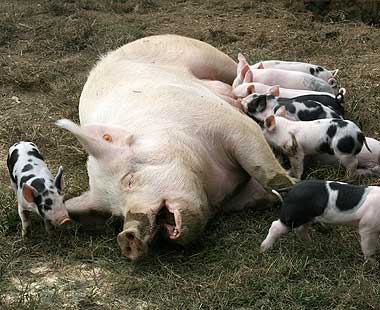 We’re sow tired of Republican politicking.Photo: woodleywonderworksTo read The Washington Post is to believe that farm subsidies are at long last headed for the chopping block. Reporter Philip Rucker offers as evidence the example of Rep. Tim Huelskamp, freshman Republican from Kansas, who has gone before his constituents explaining how subsidy cuts are real, are happening, and shouldn’t be shied away from:
We’re sow tired of Republican politicking.Photo: woodleywonderworksTo read The Washington Post is to believe that farm subsidies are at long last headed for the chopping block. Reporter Philip Rucker offers as evidence the example of Rep. Tim Huelskamp, freshman Republican from Kansas, who has gone before his constituents explaining how subsidy cuts are real, are happening, and shouldn’t be shied away from:
“Everybody needs to share,” Rep. Tim Huelskamp told a few dozen townspeople sitting patiently on the hard wooden benches of the Graham County Courthouse. “If you’re a farmer like me, you’re going to expect less. Something’s going to go away. The direct payments are going to go away.”
Huelskamp is referring to the much-maligned “direct payment” subsidies which farmers, even wealthy ones, receive based on a fixed formula regardless of whether a crop has been planted in a given year. A recent addition to the subsidy fold via the 1996 Farm Bill, direct payments were conceived of as a temporary measure to avoid subsidy restrictions in free trade agreements. They have since ballooned to around $5 billion per year.
While I don’t agree that the U.S. is “broke” or even that the debt is our greatest threat (lack of job creation and lack of middle class wage growth is), I’m not going to suggest that direct payments, which support a small group of commodity crops and the ethanol, factory farm, and export-oriented economy that thrives around them aren’t a waste of taxpayer money.
Indeed, as I read Rucker’s article I was mentally composing a post that speculated on the missed opportunity that deficit-cutting mania represents to reorient farm supports. Instead of figuring out ways to shift some of these funds from chemically intensive commodity growers to equally productive sustainable forms of agriculture, we’re just doing nothing, I was going to say.
I could go on at some length in this vein, but there’s no point. It turns out that Huelskamp and his constituents were needlessly worried (via the AP):
Republicans have quietly maneuvered to prevent a House spending bill from chipping away at federal farm subsidies, instead forging ahead with much larger cuts to domestic and international food aid.
The GOP move will probably prevent up to $167 million in cuts in direct payments to farmers, including some of the nation’s wealthiest. …
Meanwhile, the annual bill to pay for food and farm programs next year would cut food aid for low-income mothers and children by $685 million, about 10 percent below this year’s budget.
Oh, and don’t forget the kicker:
The bill also would cut the Food and Drug Administration’s $2.5 billion budget by almost 12 percent, straining the agency’s ability to implement a new food safety law signed by President Barack Obama earlier this year.
I guess farm subsidies aren’t going anywhere after all. Looks like food safety deaths won’t decrease, either. Has this country ever seen a more short-sighted, cruel, and venal group of legislators than House Republicans? I’d say more, but I need to go pull my hair out.



